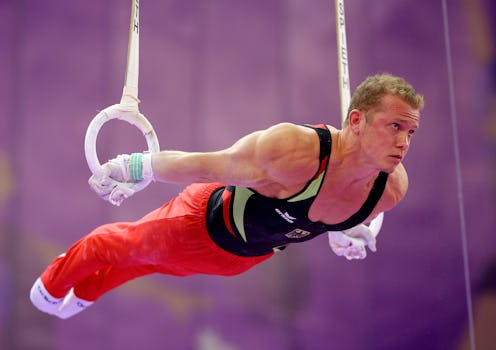News
Fabian Hambuechen Wants Reformed Gymnastics Rules
As exciting as it is to watch the U.S. athletes compete in the Olympics, learning more about their competitors and observing their events can be just as thrilling. In Germany, gymnastics star Fabian Hambuechen is known for his impressive horizontal bar performances (in the qualifying round on Aug. 6, he earned the highest score for the event). However, in Rio one of his most memorable moments so far came as he called on the International Federation of Gymnasts to reform their rules after some of his fellow gymnasts suffered injuries early on in the 2016 Olympics.
German gymnast Andreas Toba suffered a broken leg during his vault routine, and France's Samir Ait Said suffered an ACL injury while performing his floor routine during qualification rounds, which prevented both from moving on in the competition. Hambuechen said their wounds never should have happened, and their occurrence is likely because of the change in Olympic gymnastics scoring, NBC Olympics reported.
For years, gymnasts competed for a perfect 10 score, where judges determined the start value at no greater than 10, and from that bar made deductions for mistakes. But in 2004, judges made a mistake and awarded U.S. gymnast Paul Hamm the individual all-around gold despite errors in his vault routine. The top spot would likely have been given to South Korea's Yang Tae-young, had the judges not made errors that lowered his score.
So what do the recent injuries have to do with Olympic scoring now? Well, under the new rules, which were introduced in 2008, gymnasts are able to score higher than 10, depending on the difficulty of their routine. Two separate judging groups look at the scores — one part based on difficulty, the other on execution. The difficulty score, in theory, can reach up to 10, though a start value of 6 or 6.5 is more typical. The higher the gymnasts set the difficulty in their routines, the greater chance they have of earning a higher score. This, Hambuechen argued, has led gymnasts to add more risky moves into their routines, Reuters reported.
He made his opinion of the scoring clear to Reuters: "It's a pity that gymnastics has developed the way it has. Everyone is chasing more and more difficulty, more risk. Everyone wants new records, so it's getting dangerous." Hambuechen is in a unique position to comment on the effects of the scoring, as he remembers what it was like to compete under the old system.
Hambuechen first competed in the Olympics in 2004 at the age of 16, earning seventh place on the event he is now known for. He became the world champion in horizontal bar in 2007 and in 2008 earned his first Olympic medal for the event, which was a bronze. His follow-up in London ended with a silver medal. Now, he told Reuters he hopes to take home the gold.
Going into the men's horizontal bar finals on Aug. 16, Hambuechen led the qualifiers in the event where he shines. Given how vocal he has been on the gymnastics scoring, viewers will hopefully see a well-executed, yet not too dangerous routine from him.
